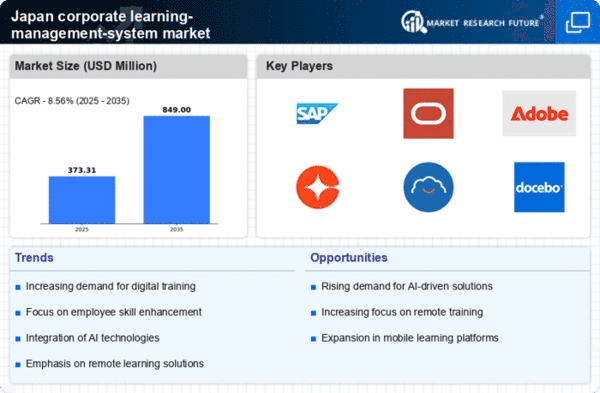Emphasis on Employee Skill Development
In Japan, there is a growing emphasis on employee skill development, which significantly impacts the corporate learning-management-system market. Companies are increasingly recognizing the importance of upskilling their workforce to remain competitive in a rapidly evolving business landscape. Reports suggest that around 70% of organizations in Japan are prioritizing training programs that focus on enhancing both technical and soft skills. This focus on skill development is likely to drive investments in learning management systems that offer tailored training solutions. As a result, the corporate learning-management-system market is expected to witness robust growth, as organizations seek to implement comprehensive training strategies that align with their business objectives.
Focus on Customization and Personalization
Customization and personalization are becoming pivotal factors in the corporate learning-management-system market in Japan. Organizations are recognizing that one-size-fits-all training solutions are often ineffective. As a result, there is a shift towards personalized learning experiences that cater to individual employee needs and learning styles. Data suggests that around 65% of companies in Japan are investing in customizable learning platforms to enhance employee engagement and retention. This trend indicates a growing recognition of the importance of tailored training solutions in achieving organizational goals. Therefore, the corporate learning-management-system market is poised for growth as businesses seek to implement more personalized learning strategies.
Growing Demand for Remote Learning Solutions
The corporate learning-management-system market in Japan is experiencing a notable surge in demand for remote learning solutions. This trend is driven by the increasing need for flexible training options that accommodate diverse employee schedules and locations. As organizations seek to enhance employee engagement and retention, the adoption of online training platforms has become essential. Recent data indicates that approximately 60% of companies in Japan have integrated some form of remote learning into their training programs. This shift not only facilitates continuous learning but also allows organizations to scale their training efforts efficiently. Consequently, the corporate learning-management-system market is likely to expand as businesses invest in technologies that support remote learning initiatives.
Increased Investment in Learning Technologies
The corporate learning-management-system market in Japan is witnessing increased investment in learning technologies, driven by the need for innovative training solutions. Organizations are allocating substantial budgets to enhance their training infrastructure, with many companies reporting an increase in their training budgets by approximately 20% over the past year. This investment is aimed at adopting advanced learning management systems that incorporate features such as gamification, mobile learning, and social learning. As companies strive to create engaging and effective training environments, the corporate learning-management-system market is likely to expand, reflecting the growing importance of technology in employee development.
Integration of Data Analytics in Learning Systems
The integration of data analytics into learning management systems is emerging as a critical driver for the corporate learning-management-system market in Japan. Organizations are increasingly leveraging data to assess training effectiveness and employee performance. By utilizing analytics, companies can identify skill gaps and tailor training programs accordingly. Recent studies indicate that approximately 55% of Japanese firms are adopting data-driven approaches to enhance their learning initiatives. This trend not only improves training outcomes but also enables organizations to make informed decisions regarding their learning strategies. Consequently, the corporate learning-management-system market is likely to benefit from the growing demand for analytics-driven solutions.
















